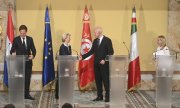EU reaches migration deal with Tunisia
The EU has signed a pact with Tunisia to curb migration across the Mediterranean. In exchange for financial aid of up to 900 million euros, Tunisia has pledged to crack down on smugglers and illegal crossings headed for Europe. Commentators ask whether such a deal with a repressive president can work - and what it means for human rights in the country.
On diplomatic black ice
Compliance with human rights must be controlled, warns the Kleine Zeitung:
“If the EU is serious about this and its moral compass is still intact, then the agreements with third countries must be designed in such a way that the EU can exercise control and influence and the tax millions only flow if the objectives of the agreement are met. This includes respect for human rights and humane treatment. ... Either way, however, we must be aware that Europe is not only giving the North African countries a lot of money but also an instrument of power. This means that the EU is treading on diplomatic black ice in the desert.”
Support for the dictator
This is an agreement for the benefit of the leaders of Tunisia and Italy, rages La Repubblica:
“This is not an agreement between the EU and Tunisia but between the EU and Kaïs Saïed, Tunisia's dictator. That is not a minor detail because the other Tunisia - the judges, politicians, journalists, intellectuals, trade unionists, representatives of civil society - is put in prison or released at Saïed's whim, or have chosen the path of exile. Meloni and Saïed need this deal for domestic reasons. ... Meloni can now tell the Italians that she has pulled the brakes on irregular immigration, and Saïed, strengthened by this international legitimation, can go back to his favourite pastime of suppressing all criticism.”
A dirty deal
The moral price for the agreement is too high, says the Süddeutsche Zeitung:
“Up to now we have heard that the Tunisian coast guard shoots at refugee boats to stop them while they are still within its own sovereign zones; now this coast guard is to be upgraded with EU money. At the same time, the ruler is stirring up anger against the migrants in the country, with some of them being driven back into the desert where they die of thirst. The EU must not allow this.”
EU must protect its borders itself
This is the wrong way to go, Lidové noviny admonishes:
“Tunisia is the most peaceful country in the crisis region of Northern Africa. Travel agencies attract customers there. So why do Tunisians make up the largest proportion of the migration flow to Europe? ... Tunisia seems less incapable than unwilling. ... The EU has nevertheless approached the country just as it did Turkey. But - even if it works - can the agreement stem mass migration? Who will patrol the coast? Isn't the Tunisian president right when he says that his country will not be the guardian of European borders? Yes, the EU must protect its borders itself. Is it not able to, or does it not want to?”

